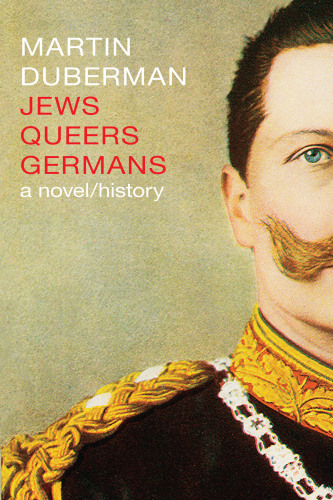
Jews Queers Germans
A Novel
فرمت کتاب
ebook
تاریخ انتشار
2017
نویسنده
Martin Dubermanناشر
Seven Stories Pressشابک
9781609807399
کتاب های مرتبط
- اطلاعات
- نقد و بررسی
- دیدگاه کاربران
نقد و بررسی

March 13, 2017
Historian Duberman is known for his biographies and accounts of the gay rights movement; he’s written plays, as well, and now adds to his résumé this “novel/history” about the gay and Jewish men who were in and near German power circles from the first years of the 20th century up to the Nazi era. It’s a rich topic, encompassing outsiders who were also—sometimes—insiders: the circle of gay men around Kaiser Wilhelm; friends Harry Kessler and Walther Rathenau, one a gay aesthete and so-called “Red Count,” the other a Jewish industrialist who became a minister in the Weimar-era government; and Magnus Hirschfeld, the Jewish, openly gay pioneer of sexology. According to Duberman, his semi-fictionalized approach, which allows for subjectivity and “informed speculation,” is needed because history-writing is stuck in the 19th century. Perhaps he’s right, but this book does not succeed in making his case. Both historical novels and history require scenes, narrative, and characters who feel alive. Duberman describes genuinely compelling figures but then leaves them to bob on waves of German history while having awkwardly expository conversations. There are juicy stories, such as the one about the openly gay Nazi storm trooper, and tragic stories, as when Rathenau, who thinks that assimilated Jews have a real future in Germany, is killed by anti-Semites. But there is never a clear story line or a sense that these characters were living, breathing people.

March 1, 2017
This earnest historical novel traces an unusual nexus of influential German men behind social and political trends from the late 19th century to the early 1930s.With his ugly title, scholar's prose, homiletic dialogue, and dire cliches, Duberman (Hold Tight Gently, 2014, etc.), a professor of history emeritus at the City University of New York, heaps up impedimenta in the way of enjoying what are at bottom some fascinating wrinkles in the belle epoque and the years leading to Hitler's emergence. It "isn't quite" a historical novel, as Duberman concedes in an Author's Note, but a "tapestry of interlocking personalities" in which he has let his period research point him "to presumptively 'likely' feelings and opinions" for his main characters. They are Count Harry Kessler, an active diarist and a wealthy player in contemporary art as patron and collector; Walter Rathenau, the head of the AEG industrial powerhouse and rare heterosexual in the narrative; and Magnus Hirschfeld, a leader in the growing field of sexology and in efforts to kill Germany's Paragraph 175, which criminalizes sex between men. Duberman traces the predominantly gay coterie of noblemen surrounding Kaiser Wilhelm II. A "hard-hitting" muckraking newsman and nasty libel trials spark moral outrage that the German ruler shrugs off, while his bellicose shipbuilding competition with the British lights a fuse to WWI. Kessler seems to know every major artist and most writers in Europe. He collaborates with Hugo von Hofmannsthal on the libretto of Der Rosenkavalier. A Berlin salon brings him and Rathenau together, and their conversational fencing over politics and culture allows Duberman to pause his heavy chronicle for perfectly theme-serving chats. For a time there is more tolerance of gays than of Jews in Germany, although Rathenau manages to rise high because of his industrial clout and diplomatic skills. As the brown shirts hit the fan, even ham-fisted cliches--"the elephant is now decidedly in the room"--can't distract from the horror of the rising violence against queers and Jews and other Germans. Duberman distills it nicely in the assassination of Rathenau and the huge funeral that followed, leading for a brief time to a Germany that might not end up embracing Adolf. There is much good here but much to wade through.
COPYRIGHT(2017) Kirkus Reviews, ALL RIGHTS RESERVED.

























دیدگاه کاربران